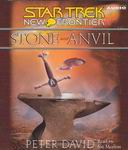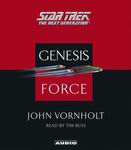
 Startide Rising
Startide Rising
By David Brin; Read by George Wilson
12 cassettes – 17.5 hours [UNABRIDGED]
Publisher: Recorded Books
Themes: / Science Fiction / Galactic Civilization / Genetic Engineering / Aliens / Dolphins / Chimpanzees / Series /
The Terran exploration vessel Streaker is on the run from the combined forces of five galactic civilizations that are hunting for them. Low on resources and staying just one step ahead of their pursuers the ship and crew crash-land on an obscure water-world called Kithrup. Soon after, in orbit above Kithrup, the might of all five galaxies fights each other for the right to claim “the prize”. The prize being that the crew of Streaker has the co-ordinates of what may be the most important discovery in millennia, the coordinates of mothballed fleet of starships that may be over two billion years old.
The second book of the Uplift Series, Startide Rising is the winner Nebula, Hugo, and Locus Awards for Best Novel of the year (1983). At the center of the Uplift Series is the idea that an “uplift” of intelligent life is necessary in order to create sentient and spacefaring races. The species that uplifts another is called a “patron species”, the species being uplifted is called a “client species”, this process is deemed absolutely necessary for the development of intelligent spacefaring civilizations. This makes sense to the Humans because on Earth the Humans have by this point genetically re-engineered both Dolphins and Chimpanzees, uplifting them to sentience. Which immediately begs the question of “who uplifted humanity”?
Recorded Books did a beautiful job on the cover, the specially commissioned painting is perhaps the nicest ever done for an audiobook. Unfortunately the cover and the packaging, are the best thing about this novel. As with many multi-volume series the paperback and hardcover versions of this book include: A glossary, a cast of characters list, a prologue, an epilogue, a postscript and a drawing (in this case of the Terran starship). Now obviously the drawing wouldn’t be able to be conveyed by a narrator, so it’s loss isn’t a big deal. But the exclusion of the glossary and the cast of characters was probably a mistake, for this novel especially, this information might have helped. I don’t really blame the producers for excluding it though, at 462 pages (making it 12 cassettes) this beast is way too long as it is.
David Brin‘s has peppered some very interesting ideas throughout the novel. Some of the ideas presented are new spins on old themes, others are quite original and interesting, at least to my ears. The overall premise of “uplift” is interesting, and would definitely be worth reading about, except for one minor issue. This is a horrible novel. Its very very very talky, there are way way way too many characters, virtually every scene that WOULD be of interest takes place off-stage, in the past or is happening and being related by a third party indirectly! George Wilson, the reader, does his best to sort out much of the muddle, no small task with more than a dozen characters, none of which are major players in the plot. These flaws along with reading the unreadable voices of many dolphins, are almost too much for poor George. And it was certainly too much for me. I lost track of who was speaking and what they were talking about many times! This is an unforgivable and deadly sin for a novel and makes me wonder how both readers and writers of science fiction could give this novel an award of any type let alone both the Hugo and the Nebula! I’ll admit that, much of the difficulty here is probably a result of this novel being a part of a series, with established characters and continuing themes. One reason for which all in all I much prefer stand alone novels. But even among series novels this was perhaps the worst novel I’ve read in years. Were I not writing a review for it I wouldn’t even bothered to have finished it. That said, maybe like Neville, the last living man on the Earth in Richard Matheson’s I Am Legend, I’m really the one who’s abnormal. Maybe this isn’t a bad novel at all. Maybe, it really is a good novel and I’ve got something wrong with me! Maybe a cast of dozens talking endlessly about events that just happened, are happening elsewhere are happening now but being related by a no-name character reading a sensor bank really is interesting. If that really is interesting and I just can’t appreciate it I’ll just have to live without it because I’m not going to listen to any more of the Uplift Series.
posted by Jesse Willis

 Captain’s Blood
Captain’s Blood Star Trek New Frontier: Stone and Anvil
Star Trek New Frontier: Stone and Anvil Startide Rising
Startide Rising Star Trek: The Next Generation: Genesis Force
Star Trek: The Next Generation: Genesis Force Falling Free
Falling Free